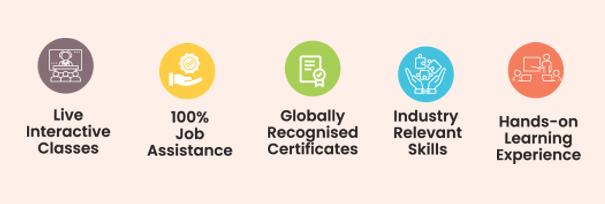In the rapidly evolving digital landscape, you might have heard of the most used term – Cloud AI! We’re here to resolve your confusion for all the non-tech individuals new to this term. Let’s dive into the details in this blog below to know more!
Cloud AI is used to describe the term Cloud-Artificial-Intelligence, which is a powerful communication tool for cloud computing and artificial intelligence.
Cloud computing is like having a supercharged computer on the internet, which stores and processes your data remotely and provides open access from anywhere. It’s why you can stream movies or use apps on your phone.
Artificial Intelligence, on the other hand, is all about making your computers smart, teaching them the capability to learn and think to facilitate the tasks that require human intelligence, like recognising faces or understanding natural languages.
Cloud AI is merging these two technologies, now reshaping the world. Scroll down to the sections in this blog below to learn more about Cloud AI and its benefits and limitations!
Understanding Cloud AI
Cloud Artificial Intelligence, also known as Cloud AI, is transforming the use of artificial intelligence, as with the use of cloud AI, all the AI services are available over the internet. All you need to do is select the service you want for your website or software and get started. One of the significant benefits of using cloud AI is that it eliminates the need for complex coding and extensive hardware.
To help you understand easily, it’s like renting the AI capabilities, including machine learning, natural language processing or computer vision from the cloud. And the add-on benefit? You pay only what you rent or what you use!
So, whether you’re tech-friendly or a completely new face to AI, Cloud AI is your answer to the learning key, unlocking advanced AIs for your ease. It’s like having your own AI assistant in the digital world, ready to help with tasks, provide insights, and even make predictions.
Core Concepts of Cloud AI –
- On-demand access: Utilize AI services instantly, paying only for what you use.
- Scalability: Use AI as your digital employees, facilitating the scaling of the businesses.
- Reduced upfront costs: Already developed AIs eliminate the need for expensive hardware and software investments.
- Simplified setup and maintenance: Focus on your application, not IT infrastructure.
- A broad range of services: Choose from pre-built AI models or build custom solutions.
Traditional AI vs Cloud AI
Traditional AI:
- It depends on owning and maintaining hardware and software, leading to higher costs and complexity.
- Struggles with limited scalability, making adjustments slow and expensive.
- Demands expertise in AI development and infrastructure management.
Cloud AI:
- It eliminates the need for upfront expenses, allowing you to pay only for the services you opt for.
- Open access to AI tools on the cloud allows easy scalability access to the users.
- Providing AI access to a broader audience makes interest a better place for visitors.
How Cloud AI Works?
Cloud AI operates through a network of interconnected data centres with powerful computing resources. This infrastructure allows you to:
- Upload your data: Feed the cloud-based AI models with your specific data to train and optimise them.
- Access AI services: Select pre-built AI models for tasks like image recognition, language translation, or predictive analytics.
- Run computations: The cloud infrastructure handles the heavy lifting of running AI algorithms on your data.
- Get results: Receive insights, predictions, or automated actions based on the processed data.
Cloud Computing Plays A Crucial Role:
- Data centres, servers, and networks that power AI computations provide the infrastructure.
- Enables scalability: Allows flexible allocation of resources as your needs change.
- Improves accessibility: Makes AI readily available to anyone with an internet connection.
Advantages and Benefits
Utilising Cloud AI offers several compelling advantages:
- It helps save resources, as with Cloud AI, you only need to pay for the AI tool you’re using.
- Since it offers ready-to-use AI tools, you do not need to invest in expensive equipment or softwares.
- Cloud AI is easy to use and demands no technical expertise to leverage the services.
- It offers quick set-up time using fast AI solutions, eliminating the need to avoid long development times.
- Cloud AI services are regularly updated, providing the latest features without extra effort.
- AI helps with proper data understanding and handles routine tasks.
- AI also helps with better customer responses and interactions.
Critical Components of Cloud AI
Data Storage and Management:
In Cloud AI, data takes centre stage as it fuels the entire AI process. Your data’s quality and quantity directly impact your AI models’ accuracy and effectiveness. So, ensuring efficient data storage and management is paramount.
- Importance of data: The saying “garbage in, garbage out” holds here. The data you feed into your AI models must be high quality, relevant, and substantial for meaningful outcomes.
- Data storage solutions: Cloud providers offer diverse storage options tailored to different needs and data volumes. These include object storage, block storage, and data lakes, allowing you to choose the best fit for your requirements.
Machine Learning and Algorithms:
Machine learning is the heart of Cloud AI, enabling models to learn and adapt from data. This integration of machine learning is a key component made accessible through cloud platforms.
- Integration: Cloud platforms provide pre-built machine learning models for everyday tasks such as image recognition, sentiment analysis, and predictive analytics. These models are ready to use, saving time and effort in model development.
- Standard algorithms: Within machine learning, various algorithms play distinct roles. These include linear regression, decision trees, and k-means clustering, each serving specific purposes within your AI models.
Neural Networks and Deep Learning:
Neural networks and deep learning are essential in handling vast data and decoding intricate patterns.
- As the name implies, neural networks draw inspiration from the human brain structure and function, which helps them mimic real-world connections and interactions. Cloud AI with neural networks can recognise patterns and proceed strongly with complex problem-solving tasks.
- Deep learning, powered by neural networks, has redefined AI capabilities, as it helps with natural language processing and face recognition and works on autonomous vehicle-like applications, pushing the boundaries of what AI can achieve.
APIs and Tools:
Cloud AI has readily available APIs and tools that provide a user-friendly platform to simplify the deployment and development of AI solutions.
- APIs: Also known as Application Programming Interfaces, serve as a connecting bridge between your applications and custom or pre-built AI models, allowing software to test and use AI capabilities without entering into the complex coding infrastructure.
- Tools: Cloud AI platforms provide visual development environments, pre-configured notebooks, and debugging tools. These resources make AI accessible to developers, data scientists, and even non-experts, building innovation and creativity in AI applications.
Real-World Applications of Cloud AI in 2023
Cloud AI is not a futuristic concept. It is already actively transforming and reshaping industries daily, as explained in the sections below –
Business and Industry:
- Healthcare: AI scans medical images, predicts patient outcomes, and customises treatment plans. Surgeons with AI-powered AR headsets can deeply navigate the issue and achieve precision in tough medical procedures.
- Finance: AI identifies fraudulent transactions, automates financial processes, and offers personalised investment advice. It promises to reduce financial crimes and streamline complex operations.
- Retail: AI customises product recommendations, optimises inventory management, and forecasts customer behaviour. Imagine a store where AI suggests clothes matching your style and budget.
Smart Technology:
- Smart Cities: AI optimises traffic, manages energy grids, and analyses crime patterns, ensuring safer and more efficient cities that adapt according to resident’s needs.
- IoT Devices: AI is now also used in smart speakers, wearables, and home appliances to understand user preferences. There is also a feature launched called AI-driven fridge, which orders supplies when they are about to finish.
- Autonomous Vehicles: Since the trend of self-driving cars is increasing, AI has also proven helpful for this sector. It predicts traffic patterns to enhance safety, facilitating more accessible, safer and efficient transportation.
Personal Assistants and Home Automation:
- Virtual Assistants: AI like Siri, Alexa, and Google Assistant comprehends voice commands, answers questions, and controls smart home devices. All you need to do is give the command; the AI-powered divide will do the task for you.
- Smart Home Systems: AI powers lighting, security cameras, learning routines, and adapting to user needs. Envision a home that automates lighting, adjusts temperatures while you sleep, and alerts you to security threats.
Challenges and Concerns With Cloud AI
While Cloud AI holds immense potential, it’s essential to recognise the challenges and concerns accompanying its rapid growth. Two critical areas demand thoughtful consideration:
Data Privacy and Security.
Data is the most essential element of AI, which it further processes and provides the answer. Therefore, data protection is important in the cloud environment.
- Keeping data safe is important, especially when using Cloud AI systems. If someone gets unauthorised access to sensitive information stored in these systems, it can cause big problems. It can affect people, businesses, and even a whole country’s safety.
- To protect this data, Cloud providers use special techniques like encoding it so that only authorised people can read it. They also set up rules to control who can access the data and have systems to detect if someone is trying to break in.
But, there’s still a risk because sometimes people make mistakes, or hackers are very clever and find ways to get around these protections. So, even though Cloud providers do a lot to keep data safe, there’s always a chance that something might go wrong.
Ethical Considerations:
Besides the technical complexities, AI raises some ethical concerns, highlighting responsible deployment and development.
- AI algorithms learn from where the information is fetched. If it is taken from the past or has a bias towards anything, AI also provides biased data and decisions, which also might mistreat people based on gender and race.
- AI understand their work process and can explain why the specific answer is given. But in case of not-so-expected or wrong answers, users must take responsibility and not leave the blame on AI.
- To make sure AI is used in ethical ways, it is important to cross-check the information, whether its fair to all or not.
Addressing these challenges isn’t only the responsibility of technologists. Governments, businesses, and individuals all have roles in shaping the ethical landscape of Cloud AI. Collaborative efforts are necessary to ensure this powerful technology benefits humanity with fairness, transparency, and accountability.
Additional Points To Consider:
- Potential job displacement: AI automates tasks and creates new opportunities. Reskilling and upskilling programs are vital for a smooth workforce transition.
- Regulations and oversight: Governments must develop regulations addressing AI’s unique challenges, including data privacy and algorithmic bias.
- Transparency and public education: Raising awareness about AI and its implications fosters trust and encourages responsible development.
Conclusion
Cloud AI, a blend of cloud computing and artificial intelligence, is changing our world. It offers easy-to-use AI solutions that can transform many industries, like healthcare and smart technology. However, it’s important to consider data privacy, security, and ethics as we use it.
As Cloud AI keeps growing, staying updated about it is smart. It’s a tech that will impact our lives and jobs more and more, so being ready for these changes is a good idea.
If you want to learn more about Cloud AI, you can check out the courses at Grras Solutions, provided in Jaipur (Tonk Road, Gopalpura and Khatpura), Delhi, Ahemdabad, Lucknow, Nagpur, and Nasik. They offer courses that cover everything you need to know about Cloud AI. It’s a great way to get ahead in this exciting field. So, take that first step to connect with the IT experts at Grras Solutions to master Cloud AI today!






